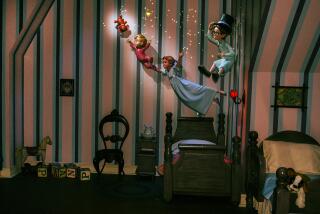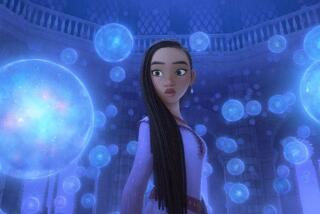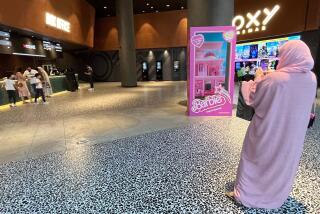Disney Will Alter Song in ‘Aladdin’ : Movies: Changes were agreed upon after Arab-Americans complained that some lyrics were racist. Some Arab groups are not satisfied.
- Share via
In a rare instance of a major studio changing a film after its release, the Walt Disney Co. said Friday it will alter two lines of the lyrics in the animated musical “Aladdin,” which some Arab-Americans have criticized as racist.
Disney said the change was made only after the studio obtained approval from the estate of the late lyricist Howard Ashman and from his collaborator, composer Alan Menken. Both won Oscars for their work on “Aladdin.”
The altered lyric, however, did not satisfy Arab groups. It was “nowhere near adequate, considering the racism depicted in ‘Aladdin,’ ” said Don Bustany, the president of the Los Angeles chapter of the American-Arab Anti-Discrimination Committee.
The lyrics in the film’s opening song “Arabian Nights,” originally were:
Oh, I come from a land
From a faraway place
Where the caravan camels roam.
Where they cut off your ear
If they don’t like your face
It’s barbaric, but hey, it’s home.
The altered lyrics, which were written as an alternate version by Ashman, are:
Oh, I come from a land
From a faraway place
Where the caravan camels roam.
Where it’s flat and immense
And the heat is intense,
It’s barbaric, but hey, it’s home.
Disney distribution president Dick Cook said the change was made after meetings with members of the American-Arab Anti-Discrimination Committee, but “it was something we did because we wanted to do it. In no way would we ever do anything that would be insensitive to anyone. So on reflection, we changed it.”
The new lyrics will be seen on the home video format, which will be released Oct. 1, and in any subsequent theatrical release of the film. “Aladdin,” with a U.S. box-office gross of $207 million since its release last November, is the most successful animated feature ever and is a highly anticipated product for the home video market.
Albert Mokhiber, president of the Washington-based American-Arab Anti-Discrimination Committee, said Friday that the committee also sought to have the word barbaric removed from the lyric and will continue to press for that. Disney has said the word was used in all versions of Ashman’s verses and will not be changed.
Cook said, “ ‘Barbaric’ refers to the land and the heat, and not to the people.”
“The changes were the right thing to do,” he said, “but we are still one word away from being pleased. We remain concerned that (Disney Co. Chairman) Michael Eisner has yet to respond to our letter or to meet with us.”
Mokhiber said the message to him “is that we are not worthy of his time or attention. Certainly I think it would be different if the situation involved African-Americans or Jewish-Americans.”
Bustany said: “There still remains the very sleazy, burlesque character in the prologue and the scene where a merchant is going to cut off the hand of Princess Jasmine because she took an apple from his stand to give to a hungry child.
Cook said “Aladdin,” which is loosely based on the stories of the “Arabian Nights” should be judged as “an entire work where the hero Aladdin, and the Princess Jasmine also are Arab.”
“Even worse,” said Bustany, “the supporting characters are all depicted as nasty mean, people. While the Aladdin character, Jasmine and her father speak unaccented, standard Americanized English all the bad guys speak in foreign accents. The lesson is that anyone with a foreign accent is bad. This is horrendous racism.”
As the Disney Co. embarked on making the change, it also altered the same lyrics now being sung in a revue at the recently opened Aladdin’s Oasis restaurant at Disneyland, at the site of the former Tahitian Terrace restaurant.
“Aladdin” is not the first Disney film to be altered. In the original version of the “Three Little Pigs” (1933), the Big Bad Wolf tried to get into the pigs’ house by disguising himself as a peddler with a heavy Jewish accent. The dialogue was subsequently rerecorded with the Wolf using a falsetto voice and all reissues have used the latter version.
The “Pastorale Symphony” section of Disney’s “Fantasia” also was re-edited in 1991 to remove Sunflower, a black centaurette/shoeshine girl who buffed the other characters’ hoofs.
More to Read
The biggest entertainment stories
Get our big stories about Hollywood, film, television, music, arts, culture and more right in your inbox as soon as they publish.
You may occasionally receive promotional content from the Los Angeles Times.










